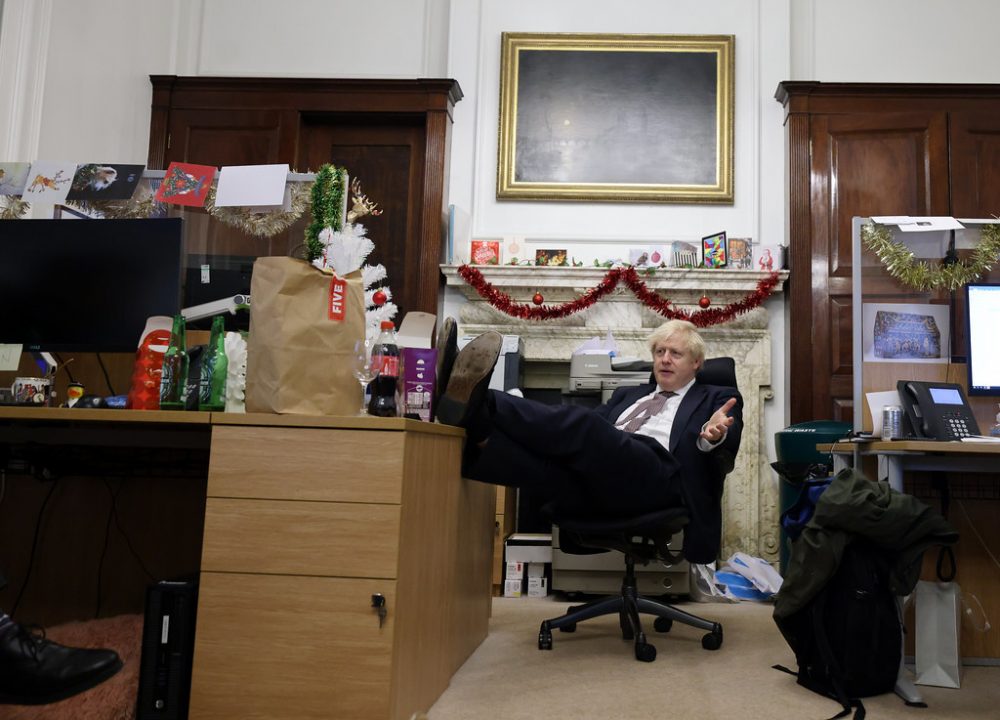And so for the moment the parliamentary Conservative party remains a hub bub of restlessness.
It’s caught between an instinct to remove Boris Johnson and a fear that a leap into the unknown with an untested leader will prove the adage ‘be careful what you wish for’.
The Scottish Tories are the most vocal in the ‘go now’ calls, with Douglas Ross and Ruth Davidson leading megaphone demands, all done in anger, not in sorrow.
There’s hard politics at play here. It is not just that the ‘Heineken Leader’ does not reach certain parts of the UK, it is the belief that if he remains in office, he will bolster Nicola Sturgeon’s hand when the referendum issue emerges centre stage, as it will at some point.
There is a supreme irony in the dilemma faced by Conservative MPs. They are now debating whether they should undo a problem principally of their own making. It was MPs who turbo-charged his rise, knowing that he was always going to carry the votes of the party membership when Theresa May was drowned in the Brexit swamp three years ago.
‘Rooted contempt for truth’
Of course, they were warned. A cursory click on Google and the red flags are there for all to see. Writing in The Guardian in 2019, the Prime Minister’s old boss at The Daily Telegraph, Max Hastings, deplored what he thought would be an exercise in ‘celebrity government’.
He was pointed and utterly exculpatory when he wrote: “There is room for debate about whether he is a scoundrel or a mere rogue, but not much about his moral bankruptcy, rooted in a contempt for truth.”
The most brutal assessment, however, came from his former cabinet colleague and fellow leadership contender Rory Stewart. His verdict is enough to make you wince.

He wrote in The Times Literary Supplement in 2020: “He has mastered the use of error, omission, exaggeration, diminution, equivocation and flat denial. He has perfected casuistry, circumlocution, false equivalence and false analogy. He is equally adept at the ironic jest, the fib and the grand lie; the weasel word and the half-truth; the hyperbolic lie, the obvious lie and the bullshit lie -which may inadvertently be true.”
Unfit for office?
The immediate crisis may well be the issue of ‘do as I say, not as I do’ with regard to Covid rules. And yes, a damning report from Sue Gray, the civil servant probing alleged breaches of Covid protocols, would almost certainly finish him. But Tory MPs should be asking themselves whether or not the latest problem at the heart of government is a mere symptom of an unfitness for office.
Boris Johnson does not have a deft political touch, he prefers the noise of bulls in a china shop.
The list of u-turns and self-inflicted problems is long: the initial ending of mass testing and then its re-introduction, the ditching of a visa surcharge scheme, the free school meals fiasco (twice), the exams results crisis in England, the numerous extensions to furlough, the support for Dominic Cummings, the Owen Paterson affair. I could go on, but won’t.
We have heard the record which is as repetitive as Richard Clayderman music in a shopping mall.
What’s the tipping point?
I think it unlikely he could survive a damning verdict by Gray. If the conclusions of her report are sufficiently qualified, he will hirple on to the local elections which almost certainly will be interpreted as an electoral test of his credibility.
The issue for MPs is simple. What’s the tipping point? Like Johnson, they want time, not least to assess who his successor should be. The plots in the corridors of parliament at the moment will be feverish even if hard conclusions might be a matter of weeks away.
The Prime Minister is the lamest of lame ducks. Yesterday, Conservative MPs sat stony-faced but at least wore their masks to spare their blushes.
The normally overly measured Sir Keir Starmer had clearly concluded that if he had to adequately represent what many people in the country feel, he had better get angry and yes, even a bit personal.
The irony here is that Starmer’s best chance of winning an election rests on much more of the same and that means keeping the Prime Minister where he is.

Johnson has lost a section of the more ideological Conservative thinkers who deplore tax rises and a big state defined by the interventionist spending spree of the last two years. Brexiteers who judged him the best man to get the job done now know that he has served his primary purpose. He is a leader with a base that shrinks by the day.
In the end, MPs will ask: What is he for? What really drives him? His time as London mayor and his rise in the Conservative Party have largely been driven by his personality and electoral appeal. When the latter wanes, he serves the Conservatives no useful purpose.
His fate is in the hands of his MPs. All parties have a similar culture when it comes to succession. Some MPs will spy a new runner who might win them a promotion. Some will choose a leader who in their judgement is the least worst option. That was John Major’s route to the premiership.
Some might even ask themselves a serious question. If Max Hastings was proved correct and this was an exercise in celebrity government, do we not owe it to the country to get serious?

 No10 Downing St
No10 Downing St

























